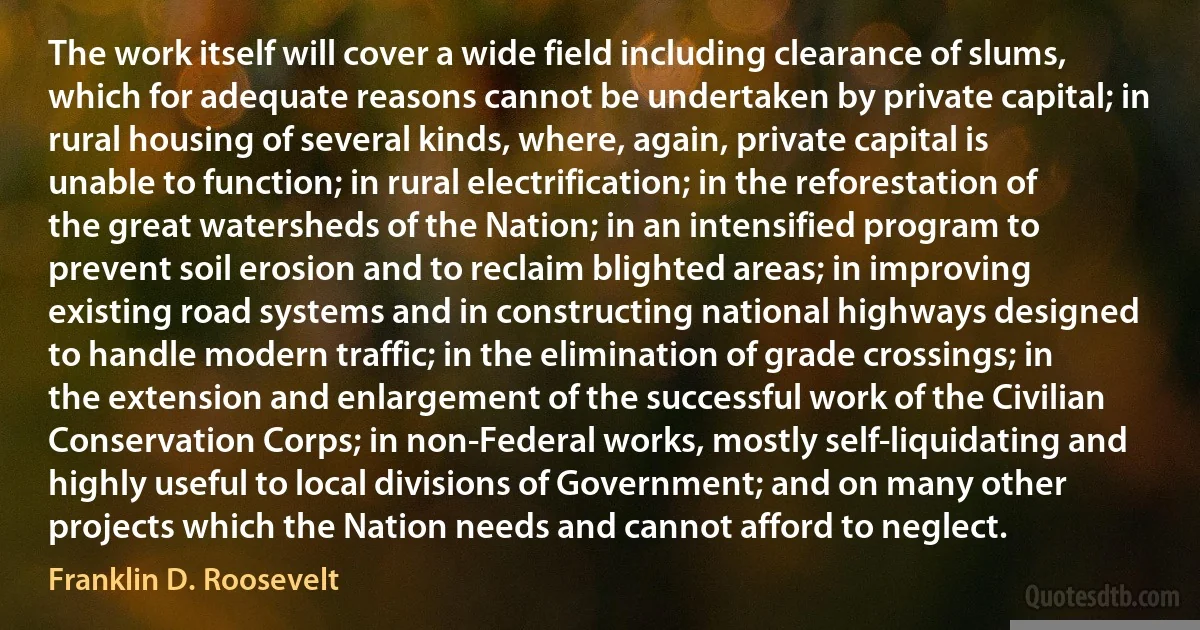Housing Quotes - page 4
There are 47% of the people who will vote for the president no matter what. All right, there are 47% who are with him, who are dependent upon government, who believe that they are victims, who believe the government has a responsibility to care for them, who believe that they are entitled to health care, to food, to housing, to you-name-it. That that's an entitlement. And the government should give it to them. And they will vote for this president no matter what.
And I mean the president starts off with 48, 49, 4- he starts off with a huge number. These are people who pay no income tax. 47% of Americans pay no income tax. So our message of low taxes - doesn't connect. So he'll be out there talking about tax cuts for the rich.
I mean, that's what they sell every four years. And so my job is not to worry about those people. I'll never convince them they should take personal responsibility and care for their lives.

Mitt Romney
The Daily News ignores, as does the Fair Housing Act, the distinction between private and public property. Should it be prohibited for public, taxpayer-financed institutions such as schools to reject someone based on an individual's beliefs or attributes? Most certainly. Should it be prohibited for private entities such as a church, bed-and-breakfast or retirement neighborhood that doesn't want noisy children? Absolutely not. Decisions concerning private property and associations should in a free society be unhindered.

Rand Paul
During late Autumn 1956, in connection with a marketing study, I forecast the imminence of a major U. S. economic recession, triggered by the over-stretching of a post-1954 credit-bubble centered in financing of automobiles, housing, and analogous consumer goods. This recession broke out in February 1957 statistics, and was generally, if reluctantly acknowledged to have occurred several months later. The recession-spiral lasted into mid-1958, and was followed by a prolonged stagnation until an upturn appeared under the Kennedy administration.

Lyndon LaRouche
American communities require that new housing meet quality requirements that are very high by world or even Western European and Japanese standards. These requirements are designed by middle-class architects, planners, and citizens in conformity with what they believe is decent housing. But their concept of decency far surpasses what is necessary for human health and safety. Consequently, all new American dwellings are too costly for low-income people to occupy without direct subsidies. But subsidies are provided for only a few of the many households with incomes low enough to be eligible for them. So poor people live in unsubsidized older dwellings.

Anthony Downs
Stirner's political praxis is quixotic. It accepts the established hierarchies of constraint as given. ... Not liable to any radical change, they constitute part of the theatre housing the individual's action. ... The egoist uses the elements of the social structure as props in his self-expressive act.

John Carroll
While I was still on the WPA I was submitting designs for the Section of Fine Arts competitions which I did on my own time. Burgoyne Diller gave me a mural to do in the Community Building of the Queensbridge Housing Project on Long Island. I worked on the design and cartoons for about a year. Everything was approved and the walls prepared - casein tempera painted on the wall.... [It was] about 1938. Holger Cahill asked me through Diller to do the outdoor facade mural of the WPA Building at the World's Fair. 1 stopped work on the Queens mural and began working on the Fair mural which was finished on schedule in time for the opening of the Fair.

Phillip Guston
Let's stop for a second and remember where we were eight years ago. We had the worst financial crisis, the Great Recession, the worst since the 1930s. That was in large part because of tax policies that slashed taxes on the wealthy, failed to invest in the middle class, took their eyes off of Wall Street, and created a perfect storm. In fact, Donald was one of the people who rooted for the housing crisis. He said, back in 2006, "Gee, I hope it does collapse, because then I can go in and buy some and make some money." Well, it did collapse.... We have come back from that abyss. And it has not been easy. So we're now on the precipice of having a potentially much better economy, but the last thing we need to do is to go back to the policies that failed us in the first place.

Hillary Clinton
Don't be scared of the high language of economists and Cabinet ministers, but think of politics at our own household level. After all, women live in contact with food supplies, housing shortages, and the ever-decreasing opportunities for children, and we must therefore face up to the position, remembering that as more power is taken away from the people, so there is less responsibility for us to assume.

Margaret Thatcher
An attempt to improve intergroup relations has to face a wide variety of tasks. It deals with problems of attitude and stereotypes in regard to other groups and to one's own group, with problems of development of attitudes and conduct during childhood and adolescence, with problems of housing, and the change of the legal structure of the community; it deals with problems of status and caste, with problems of economic discrimination, with political leadership and with leadership in many aspects of community life. It deals with the small social body of a family, a club or a friendship group, with the larger social body of a school or a school system, with neighborhoods and with social bodies of the size of a community, of the state, a nation and with international problems.

Kurt Lewin
The American political system is like a gigantic Mexican Christmas fiesta. Each political party is a huge piñata - a papier-mâché donkey, for example. The donkey is filled with full employment, low interest rates, affordable housing, comprehensive medical benefits, a balanced budget and other goodies. The American voter is blindfolded and given a stick. The voter then swings the stick wildly in every direction, trying to hit a political candidate on the head and knock some sense into the silly bastard.

P. J. O'Rourke



